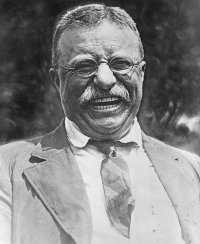
In 1906, Teddy Roosevelt directed the government printing office to adopt revised spellings for 300 English words. Wished would become wisht, calibre caliber, and though tho. “It is not an attempt to do anything far-reaching or sudden or violent; or indeed anything very great at all,” he wrote. “It is merely an attempt to cast what slight weight can properly be cast on the side of the popular forces which are endeavoring to make our spelling a little less foolish and fantastic.”
That’s about as far as he got. The House of Representatives called on the printing office to “observe and adhere to the standard of orthography prescribed in generally accepted dictionaries of the English language.” The New York Evening Post declared “This is 2 mutch,” and the Louisville Courier-Journal opined, “Nuthing escapes Mr. Rucevelt. No subject is tu hi fr him to takl, nor tu lo for him tu notis. … He now assales the English langgwidg, constitutes himself a sort of French Academy, and will reform the spelling in a way tu soot himself.”
Roosevelt rescinded the order but continued to use the new spelling himself. “I could not by fighting have kept the new spelling in, and it was evidently worse than useless to go into an undignified contest when I was beaten,” he told Brander Matthews. But “I am mighty glad I did the thing.”
